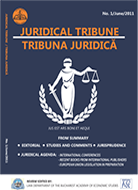Separaţia puterilor în stat şi loialitatea constituţională
Separation of powers and constitutional loyalty
Author(s): Marieta SaftaSubject(s): Law, Constitution, Jurisprudence
Published by: Societatea de Stiinte Juridice si Administrative
Keywords: loyal cooperation between institutions; separation of powers; unconstitutionality; the Constitutional Court.
Summary/Abstract: The complexity and dynamics of political life leads to developments and reconsiderations in terms of classical theories of constitutional law. Such a process occurs also in the case of separation of powers. Many factors have a bearing on how this theory is currently translated into practice, which requires additional perspectives of analysis in order to develop improved models of cooperation and balance of powers, according to new political realities. This study aims at examining the principle of separation and balance of powers in terms of mutual respect and loyal cooperation between institutions, or, in a broader sense, of constitutional loyalty, an intrinsic value-principle of all constitutions, without which no fundamental law, no matter of how democratic it might be, could function properly2. Based on examination of concrete cases drawn from the case-law of the Constitutional Court of Romania, the study demonstrates that, in lack of constitutional loyalty, the objective pursued by enshrining the principle of separation of powers cannot be achieved effectively, i.e. compliance of public authorities and political actors with constitutional provisions is purely formal and the alleged collaboration between them is a "dialogue of the deaf" at the expense of democracy. The seriousness of the consequences of this type of behaviour requires identification of remedies. What are the limits and what solutions can be identified in this regard are questions that also we aim to answer.
Journal: Tribuna Juridică
- Issue Year: 3/2013
- Issue No: 05
- Page Range: 182-193
- Page Count: 12
- Language: English

